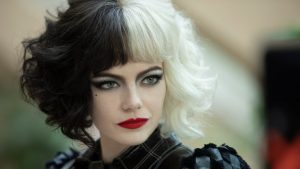
Disney’s Cruella, with all the ingredients of a pulp film, manages to be something more.
By Olivia Wooldridge
Themes of female empowerment, embracing one’s true nature and blood being thicker than water are not what come to mind when one thinks of the villainess who, for so long, has been associated with the devil herself. But the 2021 movie Cruella, starring Emma Stone and Emma Thompson, has brought those aspects of the titular character to light.
At first, as the lights dimmed and the theatre grew quiet, I worried that this film would feature a clichéd villain ‘redemption’ arc, during which a character long classified as a veritable psychopath is given a logical reason for their vicious behaviour. But not only was I pleasantly surprised by the story that unfolded, but I was given food for thought as well (some of which revolved around my wardrobe and how I could do it up, à la Cruella).
As Emma Thompson states in a featurette interview, ‘When I first read it, that’s what jumped out at me. Who leads? Our women, who are working and who are adversaries in their work… You don’t see that very often, if at all.’ And she was completely right. That is exactly what the film featured. Two women making it on their own and making it successfully, with almost no romantic interests or prospects at all. Watching that battle play out on-screen shows just how far Disney has come, from their beginnings with female characters who could not win without a man, to female characters who can and will, no matter what obstacles stand in their way.
And the film wasn’t lacking because it didn’t include romance. In fact, this lack of typical Disney romance enhanced the story more than any love side-plots could have done. It boosted both the idea of female empowerment and the theme of familial relationships, which is a character in its own right.
While neither the Baroness (Thompson) nor Cruella (Stone) requires other people in their lives, the story focuses on the unique distinction between a true villain and a traumatised character, who rises, phoenix-like, from the ashes of their past: not requiring, but wanting the special relationships that make success in life so sweet.
Cruella’s choice to have her friends and henchmen, Jasper and Horace, in her life, is a powerful statement about who she is as a person and as one of the most distinctive Disney characters to ever grace the screen. It was very much focused on choice. Not only on her choice but on theirs, to accept her for who she is and not who they want her to be. And that is a theme that Disney has shown in their other movies as well (Frozen and Inside Out come to mind), though in none has it been shown as blatantly as in this.
And that choice shows her distinction from the Baroness, who seems, to me, to be based on the traditional, cold-blooded and ruthless types that villains were always portrayed as. She is, as is stated in the film, a textbook ‘narcissist’ and puts herself first, above all others. However, Cruella represents the villain’s evolution from a 2D character to one with a solid emotional and/or logical reason forming the foundation of their vengeance.
And as I sat there, pondering this revolutionary transformation, I realised that this idea of vengeance, as opposed to personal healing, is the big difference between heroes and villains. A hero’s vengeance is always applauded because it is portrayed as a personal journey of healing. But despite the unchanging face of retaliation, a villain’s vengeance is frowned upon. To hurt someone else and make yourself feel better because of it? How evil is that? But then again, if that person has caused you harm, why shouldn’t you be angry? In the words of ex-Handmaid June Osborne: ‘Why does healing have to be the only goal? Why can’t we be as furious as we feel?’
While no spotted dogs were harmed in the making of this film, there can be no doubt left in the audience’s mind that Cruella is a truly dangerous person (albeit a highly fashionable one) who will do whatever is necessary to get even with those who have wronged her. But by the end of the film, you have to agree with her: she was born brilliant, born bad, and a little bit mad.
Olivia Wooldridge
Olivia is a writer based on the Gold Coast, currently completing a Bachelor of Fine Arts in Creative Writing and looking to work as a writer and publisher after she graduates. If you’re looking for a freelance writer, please feel free to get in touch!





